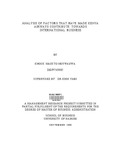| dc.description.abstract | Getting it right in the highly competitive global airline industry depends on key factors
among them competent staff, sound management and careful selection of strategic
partners.
Kenya Airways has come along way since 1980s when it was almost insolvent. In mid
1990s, as it was struggling to survive under market liberalisation, the government
stepped in and decided to turn the national airline round with the help of outside
consultants.
Once the airline was put in sound footing, it got a strategic partner, KLM Royal Dutch
Airlines who made financial investment as well as giving operational and technical
support. From then on, the airline has consistently performed better and better and
continues on profitability and expansion path. In contrast, most other airlines in Africa
are not doing that well. Most have no expansion programmes or efficiency
improvement and some are reporting financial losses.
Globalisation was recognised as a phenomenon that has most contributed to the
breaking down of trade barriers between nations thereby increasing the free
participation in international business of international firms and nations themselves.
Under globalisation, information technology has rapidly developed and has been
widely used by companies as business support system. With e-commerce, e-mail and
various accounting systems whose backbone is IT , business operation and procedures
have been revolutionised, greatly contributing to the expansion of international
business. It is easier, cheaper and more reliable to manage far off businesses from a
central or regional office than it was 15 -20 years ago. Globalisation has also given rise
to expansion in transportation systems, especially air transport where technology based
aircrafts have been produced which are faster and comfortable to the passengers. Since
the world is reducing into a global village, many people are easily travelling from one
location to the other more frequently. Tourism has also flourished under globalisation
which has directly benefited the airline industry.
The underling assumption in this study was that there were factors that made Kenya
Airways operate so successfully and in the process increase its participation in
international business.
Data was collected from selected KQ employees who are in a position to understand
the state of business operations and the strategies in place to achieve corporate goals.
The research design utilised a case study method since the study required in-depth
details of the factors that have enabled the organisation to succeed. Questionnaire was
the main instrument of collecting data with structured questions, both close ended and
open ended type of questions. Content analysis method was used in analysing the
collected data.
The findings revealed certain factors that were repeatedly mentioned by the study
respondents as being behind the success of the airline. These were taken and further
ana lysed on their content for the success of KQ. Among the key factors mentioned
included the strategic choice of partnerships, application of IT, staff competence
through training, globalisation effects and sound top management composition. | en |

